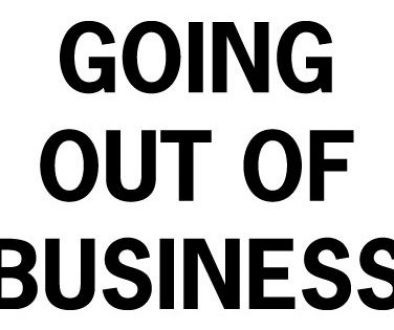Think About the Worst Case Business Failure Situation and Prepare for It
This is part of a series — Five Things to Do When Your Business is Failing
- Grow the Top Line With Quick Sales
- Aggressively Triage and Cut to Focus on the Core Business
- Don’t Let Your Business Fail Alone-Ask for Help
- Think About the Worst Case Situation and Prepare for It
- Keep Your Personal Core Protected So You Can Do It Again
Worrying about the bad things that can happen as you run out of cash can be paralyzing, which accelerates the downward spiral. A proven way to break out of the self-reinforcing negative thinking trap is, paradoxically, to embrace it.
Think about what the absolute worst that can happen, and figure out how to counter that. Then do the same with the other potential situations. At the end of the exercise, you will have a complete list of possible steps that can be taken, many of which can be done in parallel.
What is the worst case — will you die? Probably not. Go to jail? Doubtful. OK, how about business and personal bankruptcy? Maybe. Credit destroyed for seven years? Sure. Divorce? Maybe, but if your spouse leaves you because you have to sell your house and move into a double-wide, you may have other issues in your marriage. Loss of professional reputation? Probably not, unless you do things that are morally objectionable. Run your business in a respectable fashion, and even if you fail, you should be able to go work for one of your current competitors and rebuild your life. So, if you can handle the worst case, set that aside and concentrate on getting your business back on track.
And if you are feeling squeamish about laying off people, reducing salaries, and publicly looking like you have hit a bump in the road, get over it. Focus on priorities. Providing for your family comes first, keeping the company in business so you can continue to operate comes second, providing jobs and paychecks for the remaining employees comes third, keeping customers satisfied and happy is next, and looking out for your vendors and suppliers comes last. There is a strict order of priority, and if you have trouble doing what you have to do, think about the families of the people that depend on the paychecks from the company. After that it is easy.
On the bright side, there are many intermediate steps that can be taken before making cuts. It is best to lay the groundwork for these steps while the business is still doing well, and to stay in touch periodically in case you need to bring them into play.
While the business is still chugging along, find out about outside investments. There are many groups of people that would like to be able to invest in an established business, and would be able to provide cash for a piece of the company. The money will of course come with supervision and conditions, but that is only fair. It is best to take on outside investment while the company is doing well, and use the additional capital for expansion with a good prospect for a decent and quick return. But an established businesses that is going through a rough spot still has value, and maybe some outside advice from new backers with more experience than you is exactly what you need to succeed at this point in time.
Instead of selling off a chunk of the business, you could sell the whole thing. There are so many mergers and acquisitions going on, I am sure you could find someone that would see value in your company. Personally, I like the idea of growing our company into something that is fully self-sustaining and provides a regular stream of profits into the far off future, but everyone has different goals. Some people build companies for the express purpose of selling them in a few years — they take their profits, take a well deserved vacation for a few months or a year, then start another company. What you learn and the experience you get in building, growing, and selling a company is valuable and transferable to other businesses. It is experience everyone who gets an MBA would trade their eye-teeth for, and you have to make the most of it
Another friend of mine does just that — he helps start and build companies with the exit strategy defined at inception. He has extensive experience in the medical device industry, has an extensive nationwide contact list of doctors, and is on a steady three to five year cycle. He works with a new company as a minority owner, helps get them launched, successful, and profitable, then moves on when the company is acquired or the owners buy him out. He is able to do this because his doctor contacts know that when they are working with him, he will bring them a good product, it will be supported well, and he will help them be successful. The only problem is that he has so many opportunities with new companies, and he can’t work through the whole cycle fast enough, so he has to pass on a few here or there. That is a good problem to have.
But if you are not ready to exit your business just yet, there are intermediate steps you can take to keep cash flowing:
- Factor your receivables. All the money that customers owe you? Sell those receivables off for immediate cash at a discount. I would not like doing this, but it is an option.
- Ask for extensions from all your creditors. They would rather help you stay in business and get slow paid than help force you into bankruptcy and get nothing. The conversation goes better if you lay out on the table the situation you are in and what your plan is to turn it around.
- Ask your professional consulting team for ideas. At this point, you should have a good law firm, accounting firm, and group of bankers that have worked with you for years. They have probably seen this type of situation more often than they like. Tell them what is going on and ask for advice on what to do.
But above all, don’t get paralyzed by worrying about things that are outside your control. Think about the worst possible realistic things that can happen, and take steps to minimize their impact. Work like crazy on influencing the things you can control, put all options on the table, and step through your get well plan.
Author: Rolf Versluis
Published at Priority Queue



Five Things to Do When Your Business Is Failing – Priority Queue
May 5, 2020 @ 1:57 pm
[…] Think About the Worst Case Situation and Prepare for It […]